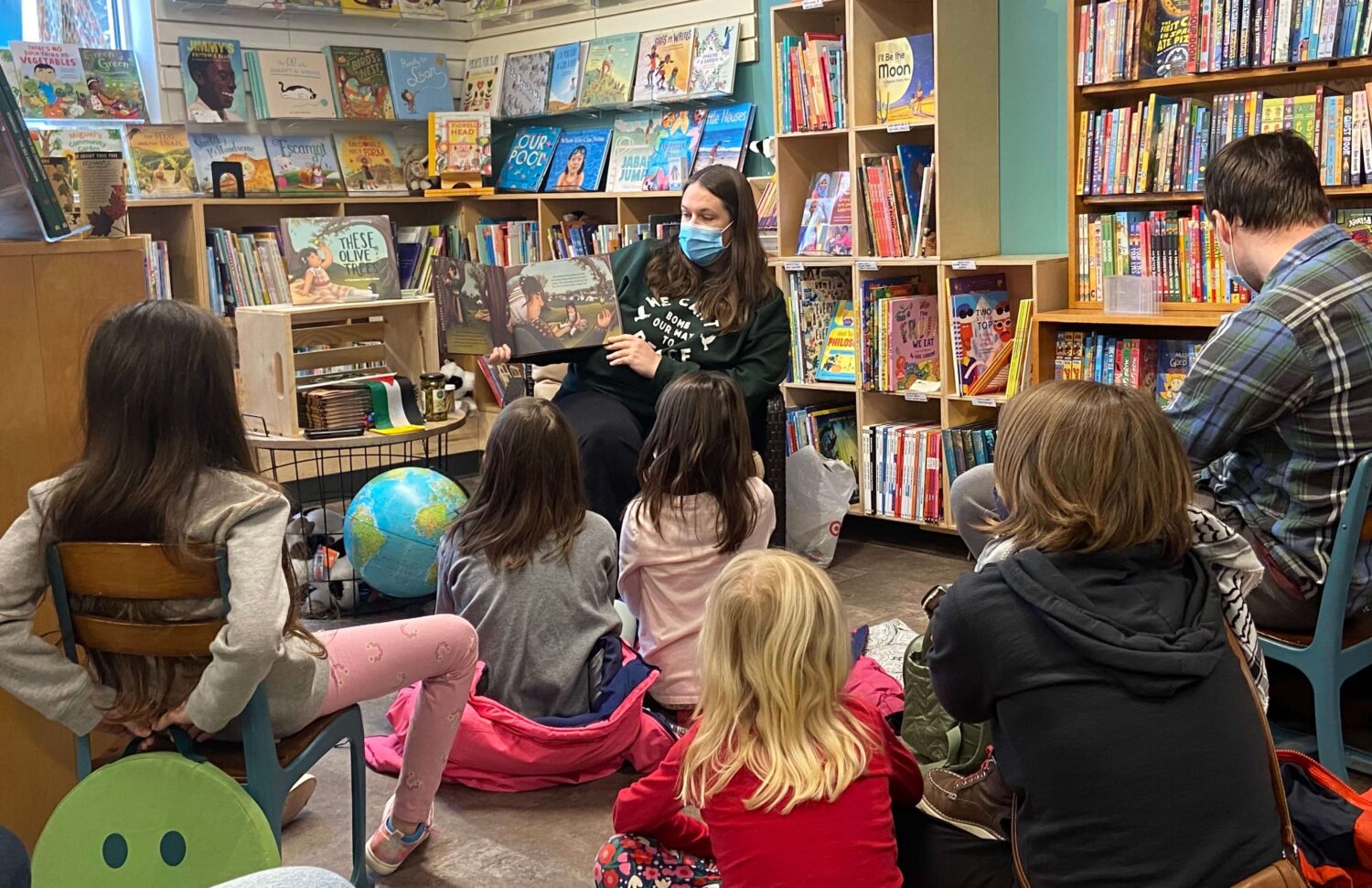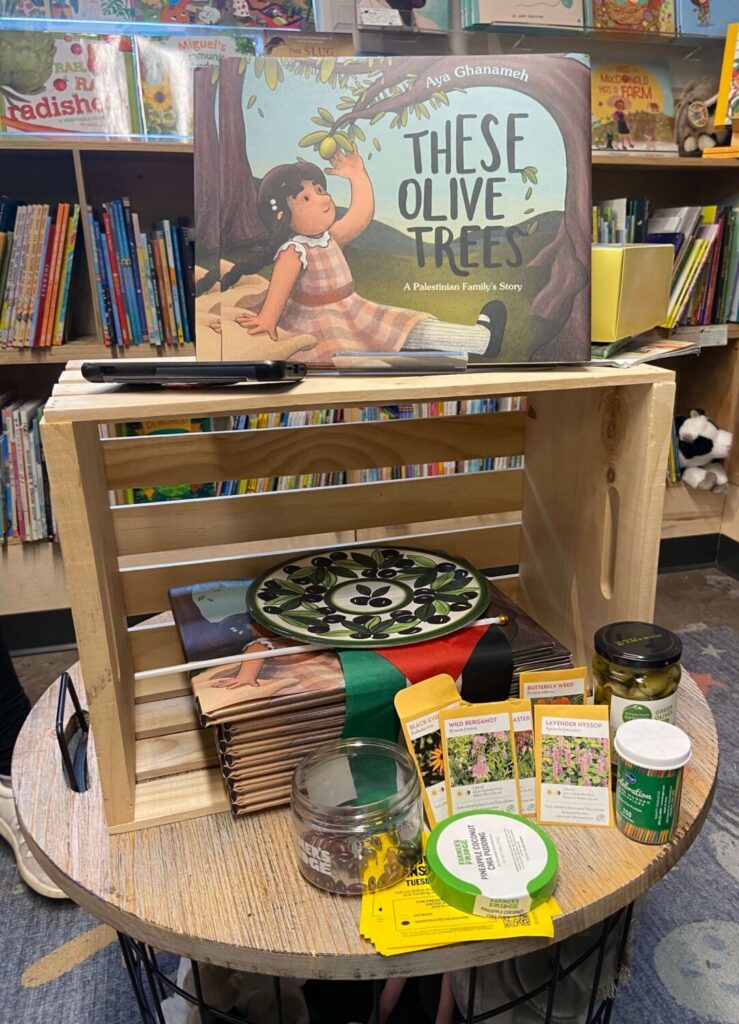
The Madison-Rafah Sister City Project (MRSCP) hosted a Read Palestine! Book Project storytime hour on March 24 for 5-9-year-olds with the book “These Olives Trees” by Aya Ghanameh at A Room of One’s Own. This event, which was the final one in Read Palestine!’s three-part series, was led by MRSCP volunteer Lisa Masri.
The Madison-Rafah Sister City Project is a volunteer-run organization that has been working in Madison for more than 20 years, with a specific focus on Palestinian rights and the city of Rafah. About six months ago, prior to Israel’s most recent attack on Gaza, MRSCP decided to launch a pilot program with an emphasis on kids and young adult literature.
MRSCP has hosted read-alouds for Palestinian children in the Madison school district and has donated books to their classroom libraries so that they can feel represented in those spaces. Now, with the heightened attention on Israeli’s occupation of Palestine, these storytimes have widened their reach, and strive to tell stories about “regular Palestinians doing regular things” in the face of systematic, dehumanizing rhetoric.
“More people have their eyes on Palestine and want to know more,” Masri said. “I think it’s become such a widespread issue that people are even willing to think of it as not just something we read about on the news.”

She continued: “It’s a social justice and human rights issue that affects us, especially [those of us] living in the U.S., since our government is so supportive of it. So I think people are willing to have their kids be educated about what Palestine is and who Palestinians are.”
Masri and her family moved to Madison two years ago. Prior to this, she lived in Nablus, Palestine for 15 years, where she taught and conducted research related to development and humanitarian aid. She quickly joined the Madison-Rafah Sister City Project upon moving to Madison, and also serves as a research administrator at UW’s Institute for Research on Poverty.
Masri began her storytime by having everyone introduce themselves in Arabic and showing attendees where Palestine should be labeled on a globe, but where Israel currently sits. She then explained the 1948 Nakba (during which the Israeli government orchestrated a mass exodus of at least 750,000 Palestinians from their homeland) in an age-appropriate way, emphasizing the unfairness of being pushed out of one’s home.
“These Olive Trees” tells the story of a young girl named Oraib, who is born and grows up in a refugee camp after her parents were displaced from Nablus, the same city where Masri lived in Palestine. Oraib cares for the olive trees in the camp, which Masri explained are a symbol of the “strength and steadfastness of the Palestinian people.”
Because of the 1967 Israeli occupation of the West Bank, Oraib and her family are forced to move yet again, abandoning the olive trees that she’d been tending to and had grown to love in the refugee camp.
Jay Lowe, a bookseller at Room, emphasized the importance of “These Olive Trees” being told from a child’s perspective. “I think it has a very human element of seeing conflict,” he said. “It’s being presented to the children from a children’s gaze. I think that’s important for them. It’s just very humanizing.”
“Books in general, for any cause or any movement work, [are] a great entry point, both in terms of education and a knowledge base, and also understanding perspectives or experiences other than your own,” Room bookseller Mira Braneck added. “It’s a great on ramp.”
The story concluded on a hopeful note, with Oraib planting an olive pit in the refugee camp before she leaves, telling it to wait for her.
Attendees were then encouraged to try green olives and were given biodegradable cups to plant seeds and beans in, in an effort to send hope to Oraib’s character and those in Palestine right now. While they packed their seeds and beans in with dirt, Masri gave children the option of having their names written in Arabic on their cups.
In the coming months, the Madison-Rafah Sister City Project is also looking forward to hosting book clubs featuring Palestinian literature for 4th-12th graders. For those looking to get involved, Masri suggests subscribing to their weekly emails.
“It’s a great way [to get involved], especially for people who feel overwhelmed by what to read, what to look at, and what to do,” she said. “We list all the events that are going on in Madison, online events that people can attend, and articles to read and good resources that are out there.”
Room bookseller G. Romero-Johnson observed that there is a desire in the Madison community to continuously get involved with efforts to support Gaza and educate themselves about the ongoing genocide.
“We want to shed light on [Pro-Palestine events] and hold space for that,” she said. “I think as the months go on, a lot of media has been dying down and it’s important to make sure that locally, we can make sure that it’s still very much in the conversation and being talked about, even with the kids,” she said.
Braneck emphasized: “We are a bookstore, we are an overtly political space, but we function really well as a third space where people can come and do this work, and we are thrilled to host this work.”
Below is a list of books that the Madison-Rafah Sister City Project recommends for those looking to learn more about Palestine:
For Adults:
- The Hundred Years’ War on Palestine by Rashid Khalidi
- The Ethnic Cleansing of Palestine by Ilan Pappé
- They Called Me a Lioness by Ahed Tamimi & Dena Takruri
- The Question of Palestine by Edward Said
- Ten Myths About Israel by Ilan Pappé
For Children:
- We Are Palestinian by Reem Kassis
- Sitti’s Bird by Malak Mattar
- These Olive Trees by Aya Ghanameh



